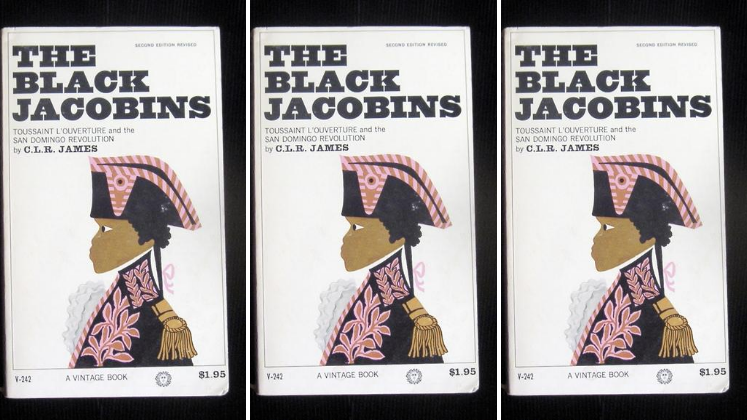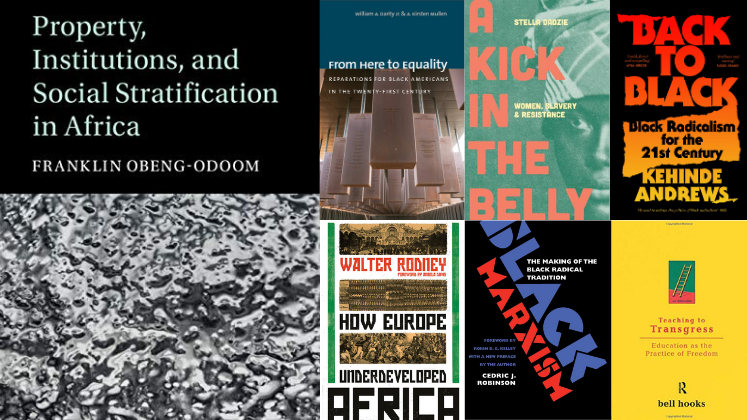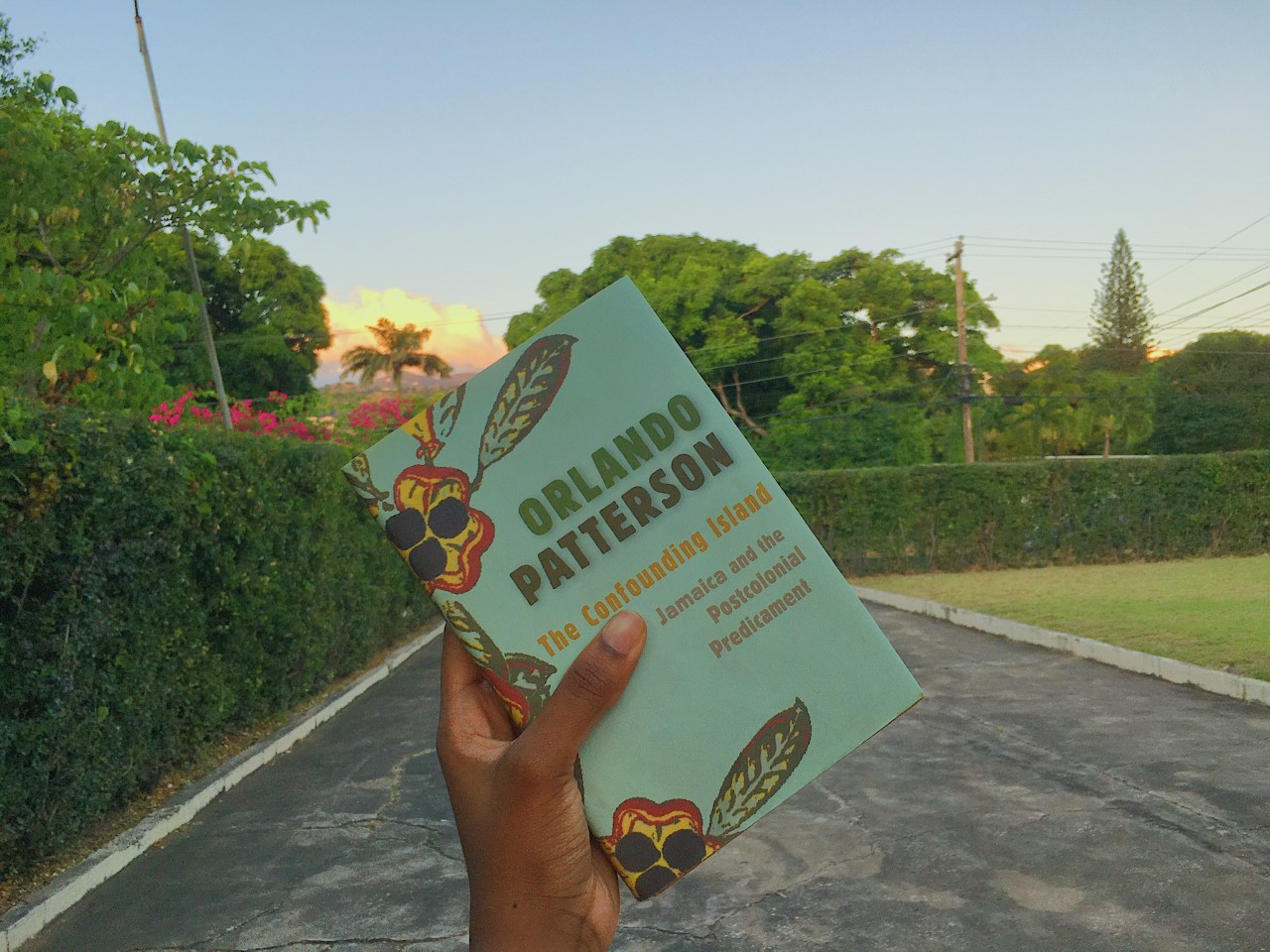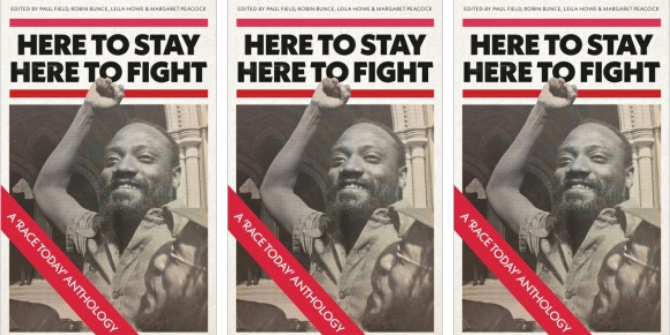On 6 March 2022, Ghana celebrated 65 years of independence. Originally published in 1977, in Nkrumah and the Ghana Revolution, C. L. R. James tells the history of the socialist revolution led by Kwame Nkrumah, the first president and prime minister of Ghana. In this edited excerpt from her Introduction to Duke University Press’s new edition, editor Leslie James argues that James was not simply writing a history of the transition to political independence in Ghana, but an account of Africa’s contribution to revolutionary theory that showcased James’s global thinking at work.
You can read more about Kwame Nkrumah’s time at LSE on LSE History blog.
Nkrumah and the Ghana Revolution. C. L. R. James. Leslie James (ed.). Duke University Press. 2022.
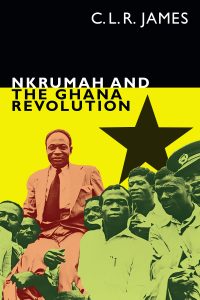 By the time C. L. R. James published Nkrumah and the Ghana Revolution in 1977, it seemed as if James’s book had been eclipsed. Originally drafted in 1958, by 1977 the transformative social and political revolution of Kwame Nkrumah and the Convention People’s Party (CPP) that James analyzed was well and truly over. A coup in 1966 deposed Kwame Nkrumah and overturned the government of the CPP. James himself publicly broke with Nkrumah in 1964 after Nkrumah deposed a sitting chief justice in order to impose his will on the courts. Yet James’s book was never intended as a simple commentary or celebration of the transition of one state from colonial to sovereign status; it was an explanation of Africa’s contribution to revolutionary theory. Determined to see his work gain life as a public document, James added a series of letters and speeches created after 1960 and published his analysis in two parts nearly two decades after he first sat down to write it. Today its context, its meanings, and indeed its very content hold such an array of possibilities for readers because it is not, and never has been, one work.
By the time C. L. R. James published Nkrumah and the Ghana Revolution in 1977, it seemed as if James’s book had been eclipsed. Originally drafted in 1958, by 1977 the transformative social and political revolution of Kwame Nkrumah and the Convention People’s Party (CPP) that James analyzed was well and truly over. A coup in 1966 deposed Kwame Nkrumah and overturned the government of the CPP. James himself publicly broke with Nkrumah in 1964 after Nkrumah deposed a sitting chief justice in order to impose his will on the courts. Yet James’s book was never intended as a simple commentary or celebration of the transition of one state from colonial to sovereign status; it was an explanation of Africa’s contribution to revolutionary theory. Determined to see his work gain life as a public document, James added a series of letters and speeches created after 1960 and published his analysis in two parts nearly two decades after he first sat down to write it. Today its context, its meanings, and indeed its very content hold such an array of possibilities for readers because it is not, and never has been, one work.
First, Nkrumah and the Ghana Revolution is a work that displays James’s intellectual practice. It demonstrates his utter conviction in his arguments and gift for determined polemic, alongside a purposeful commitment to adjusting analysis and strategy to current conditions. Consider James’s introduction to the book in 1977: by this time not only had James broken with Nkrumah but Nkrumah had survived numerous assassination attempts (the closest were in 1962 and 1964), along with the coup that deposed him, forcing him to live in exile until his death in 1972 in Conakry, Guinea. Despite all these changes, James remained firm in his analysis: “Events since 1958 give me no reason to modify and bring up to date what I wrote in 1958” (6).
We see the same confidence in the preface to the 1963 revised second edition of James’s masterpiece, The Black Jacobins, which we know he was working on at the same time as he wrote the manuscript on Ghana (see appendix 1). “This book was written in 1938,” he writes. “Today, I have little to add to or subtract from the fundamental ideas which governed its conception.” In the basic ideas and arguments of both texts, James was sure. Yet he leaves an opening. In 1963 James added an appendix to the Black Jacobins titled “From Toussaint L’Ouverture to Fidel Castro,” which he wrote for “West Indians, a people of the middle of our disturbed century, concerned with the discovery of themselves.” In 1977 James explained Nkrumah and the Ghana Revolution as a record of “a sequence of political responses to an extreme political situation, the African situation, as it has developed” (18). Together, both texts are not an end point. Rather, they are situated in the midst of history and among a people in development; they are made as a tool for learning and growing.
Why was James so sure of what he wrote in 1958? The short answer is that he was not merely commenting on a sequence of events — he was adding new implements to revolutionary theory. James drafted part I of the book in the midst of coauthoring a book on the 1956 Hungarian Revolution, Facing Reality. Indeed, as the letters in appendix 1 of this edition show, James set Facing Reality aside to prioritize his manuscript on Ghana. He completed the first draft just as he returned to his native Trinidad, where he became directly involved in Caribbean politics for the first time since he had departed for England in 1932.
Crucial elements of part II of the book were written during his time in the Caribbean; others were written as James engaged with the rise of Black Power in the Caribbean, the United States, and Canada, as well as with a new set of African socialist leaders, particularly Julius Nyerere in Tanzania. This book was forged, then, both in and by the actions of peoples in Africa, the Caribbean, North America, and Europe. What James was interested in, broadly, was theorizing how collective action took shape in specific classes and contexts and analyzing what particular historical moment and set of factors converged to move people toward internal creative action. Nkrumah and the Ghana Revolution was James’s version of what he argued he saw in Caribbean people as a whole in the 1960s: “Passion not spent but turned inward.”
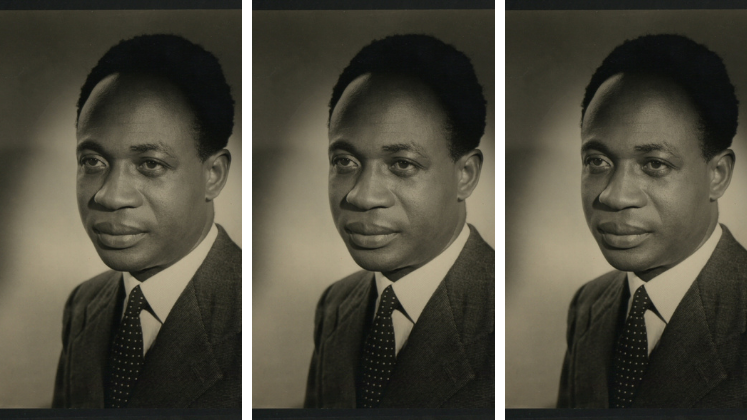
Image Credit: Triptych image of ‘CO 1069-50-1’ from The National Archives UK. No known copyright restrictions.
When James attended Ghana’s independence ceremony in March 1957, where he says he first got the idea to write his book on Nkrumah and the CPP, he was no Caribbean outlier in Ghana, nor was he a rare African diaspora intellectual and activist to ally himself with Nkrumah’s project. African diaspora commitment to Ghana was real and material. We know that many African Americans worked, traveled, and lived in Ghana in the years after independence. Indeed, African American presence in Ghana far exceeded the famous intellectuals like W. E. B. Du Bois and St. Clair Drake, artists and writers like Maya Angelou, and labor leaders like Vicki Garvin and George McCray. Ghana sought the aid of both Jamaican chief minister Norman Manley and Trinidadian chief minister Eric Williams to send legal experts to help the new state ( Norman Manley to Padmore, 23 March 1957; Padmore to Eric Williams, 15 March 1957, Sc/BAA/187, Bureau of African Affairs Papers, George Padmore Library, Accra, Ghana). Nkrumah also recruited two Caribbean-born, UK-based men to advise the new Ghanaian government in 1957: the illustrious Saint Lucian William Arthur Lewis became Ghana’s first economic advisor, and the Trinidad-born George Padmore became Nkrumah’s Advisor on African Affairs.
Padmore was a crucial anticolonial organizer who served as a connecting point for many colonial travelers who arrived in London from Africa, South and Southeast Asia, and the Caribbean during the 1930s, 1940s, and 1950s. Padmore, a lifelong Marxist, turned his nom de guerre (he was born Malcolm Nurse) into a well-known name through his work for the Communist International in the early 1930s, when he also edited the globally circulated Negro Worker. This period of his life also facilitated the theoretical knowledge and organizational networks that he harnessed after he broke with the Communist Party and moved, by 1935, to London. James and Padmore, in fact, had known each other since their boyhood together in Trinidad. Once each of them separately made their way to London, they collaborated closely through an organization and paper they helped to found: the International African Service Bureau and International African Opinion. At the end of 1938 James left for the United States, and for the next decade and a half the two men worked from different poles. However, they remained in contact, and it was James who introduced Kwame Nkrumah to Padmore via a letter in 1945.
James first met Nkrumah in 1943 through his close political comrade, Raya Dunayevskaya, when she took James to Lincoln, Pennsylvania, where Nkrumah was a student. Throughout the rest of World War II the two men met to discuss political strategy, as James tutored Nkrumah in the skill of underground political work. And although James introduced Nkrumah to Padmore by stating, famously, that Nkrumah was “not very bright,” James later claimed that Padmore knew exactly what he meant by the statement: “The man is a born revolutionary, devoted completely,” but his intellect needed a deeper education in Marxist theory. Nkrumah’s contact with Padmore throughout the late 1940s and 1950s was frequent and detailed. Although Nkrumah returned to the Gold Coast in late 1947, they maintained regular correspondence, a connection aided by Nkrumah’s secretary after 1952, Trinidadian Joyce Gittens (Padmore to J.G., April 1953, box 154-41, folder 14, Nkrumah Papers, Moorland Spingarn Research Centre of Howard University, Washington, DC). In 1954, Padmore also produced a book on developments in Ghana, The Gold Coast Revolution.
James remained in touch with Nkrumah in a more limited capacity after 1945. Grace Lee (Boggs), James’s political comrade, whom Nkrumah also befriended while he studied in the United States, facilitated their communication. Indeed, Lee Boggs traveled from Detroit to London in 1957 to assist him in the preparation of the Ghana manuscript. Lee Boggs, James, and Dunayevskaya collaborated closely in their writing and political organizing throughout the 1940s and 1950s, shaping their political ideas into a distinctive group on the US left known as the Johnson-Forest Tendency. But while James’s contact with Nkrumah was somewhat limited, his return to England in 1953 afforded a closer connection again with Padmore. And when Ghana celebrated its independence in March 1957, both James and Padmore traveled from London to Accra as invited guests. James stayed in Ghana for two weeks, while Padmore stayed for two months. Back in London, James set to work on three projects at once: a revision of his 1938 Black Jacobins, a co-authored pamphlet with Grace Lee Boggs and Cornelius Castoriadis (Pierre Chaulieu) on the Hungarian Revolution, and the book on Ghana. The letters in appendix 1 show how these projects all collided in James’s thinking.
For both Padmore and James, independent Ghana seemed to demonstrate the possibilities for building socialism in societies and governments that were trying to forge a new path out of European colonial rule. By the end of the year, both men had departed London in order to involve themselves more directly in this task. Padmore and his partner, Dorothy Padmore (Pizer), moved to Accra in December 1957 and lived there until their deaths in 1959 and 1964. Dorothy, also an author and journalist, collaborated with Padmore on his manuscripts, and the couple coauthored some work together. Indeed, James’s unfinished biography of Padmore always maintained that “Padmore was the man he was because of the tremendous assistance he had from Dorothy.” She remained in Ghana after Padmore’s death and worked for the Nkrumah government.
In early 1958, James accepted an invitation to participate in the opening ceremony of the British West Indies Federal Parliament in Trinidad. He also began to help draft party documents for the People’s National Movement (PNM), a young political party founded by one of his former students, Eric Williams, whom James tutored in Trinidad in the 1920s and then mentored in London in the 1930s while Williams completed his doctorate at Oxford. Williams’s dissertation became the basis for his groundbreaking book Capitalism and Slavery (1944), which set out to show how African slavery and the slave trade provided the financial basis for the development of modern industrial capitalism. In 1956, Williams consulted both James and Padmore in London before founding the PNM. By the end of 1958, James and his wife, Selma James, were living in Trinidad and working together to edit and produce the PNM’s official organ, which James renamed the Nation.
When James took over the Nation, it provided a vehicle for his belief that building up knowledge within a people was essential to self-government. In the pages of this weekly newspaper, he promoted socialist planning and, crucially, the development of Caribbean identity as a unique and unified people. He also made it clear why he believed Nkrumah’s project was relevant for Trinidad: “If we pay attention to India and to Ghana, it is because they are clearing the road which vast millions in our position are following. Our racial affinities with them give us an added interest but we know the degree to which we as a people . . . [are also] organically associated with British civilization” (Editorial, “A Few Plain Words,” Nation, 8 January 1960). In May 1959, the Nation reprinted a speech given by Nkrumah in Guinea for the celebration of Africa Freedom Day. And, in July 1959, contrary to James’s later criticism of Nkrumah’s treatment of the Opposition, the paper reprinted a series of articles supporting Nkrumah’s strict policy toward the opposition and curtailment of the press in Ghana.
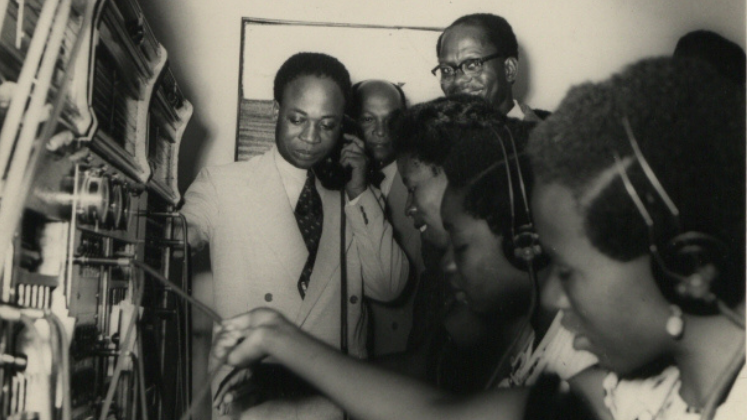
Image Credit: Crop of ‘CO 1069-43-49’ from The National Archives UK. No known copyright restrictions.
In March 1960, the Nation produced a special memorial number for the third anniversary of Ghana’s independence. The front page was emblazoned with a message from now-premier Eric Williams, which praised the “progress” of Ghana as a “model which in our own way . . . we would do well to emulate.” In contrast to this more general and nation-building oriented message, James’s editorial offered a wider, more international, humanist interpretation: it was the “vision” and “courage” of Ghana “in the service of a better world” that “should be admired and studied by all.” His editorial sent greetings to Ghana “in the name of our whole community,” and the supplement reprinted a transmission by James about the West Indies delivered to Ghana and Nigeria via a BBC London broadcast. This special issue of the Nation included an essay by James entitled “The People of the Gold Coast: They Created Ghana,” which contained elements of Nkrumah and the Ghana Revolution.
In the Nation, James aimed to put forward “the problems of the people . . . as stated by the people themselves” rather than the “point of view of the government.” But as someone who had been away from Trinidad for more than a quarter of a century and in a subordinate position to Williams, his younger, former student, James walked a thin line while in Trinidad. He faced increasing opposition from within the PNM, and Williams began to distance himself from James. James was vocally critical of US military imperialism in Trinidad, a critique that in principle Williams also shared. But when it came to Trinidad’s negotiation of the terms of the US lease of Chaguaramas, a military base occupied since 1940 under the terms of the Anglo-American Lend-Lease Agreement, the two men’s approaches did not align in practice. After March 1960, James resigned from editing the Nation. In October 1960, the PNM voted to expel him from the party.
For the next six years, James moved back and forth between London and the Caribbean. In London he continued to write, deliver lectures, and run a study circle with young Caribbean radicals including the Jamaicans Richard Small and Norman Girvan, future sociologist Orlando Patterson, and historian Walter Rodney. In Trinidad he built up connections with the Oil-field Workers’ Trade Union and its leader, George Weekes. In 1965, James cooperated to found a new political party, the Workers and Farmers Party, which contested Trinidad’s elections at the end of the year. Unfortunately for James, the party was unable to win electoral support, gaining no elected seats and only 3 percent of the popular vote.
Yet James also found inspiration from his interactions with a group of Caribbean students based in Canada. Between late 1966 and early 1968, James made several visits to Montreal, where he was invited to give public lectures as well as private sessions with a group of students who admired, but also prodded and challenged, James’s thinking. The group of students in Montreal had contacts in most other Canadian cities as well as in New York, and many went on to play prominent roles in the rise of a new left in the Caribbean. These students included future prime minister of Dominica Rosie Douglass, Anne Cools of Barbados, Franklyn Harvey of Grenada, Tim Hector of Antigua, Robert Hill of Jamaica, Alfie Roberts of St. Vincent, and Walton Look Lai of Trinidad.
Montreal thus served as an intellectual petri dish for a new phase of Caribbean radicalism. At the same time, events in Montreal reverberated outward into the Caribbean. Two separate sparks from Montreal set off protests in the Caribbean that articulated a “regionally-linked, home grown Black Power movement.” In October 1968, Montreal hosted the Congress of Black Writers, which witnessed a convergence of US and Caribbean leaders including Walter Rodney, James Forman, and Trinidad-born and US-based Stokely Carmichael. James delivered two lectures at this event, but it was the ideas and leadership emanating from Carmichael in particular that impressed the audience and captivated James. When Walter Rodney attempted to return from the conference to his teaching post at the University of the West Indies Mona (Jamaica), the government denied him entry and deported him back to Canada. The Jamaican government’s expulsion of Rodney set off the wave of “Rodney riots” that stimulated Black Power in Jamaica.
The second spark from Montreal came months later. In January and February 1969, after university administrators at Sir George Williams University appeared to be stalling action in response to a complaint lodged by six black students from the Caribbean of racially biased grading by a biology professor, students and community organizers occupied the university computer lab. The “Sir George Williams affair” placed Canadian racism on stark display, with racist vitriol shouted at those occupying the building, police violence against demonstrators, and blatantly harsh legal punishment administered to black participants after the end of the occupation.
Once news of the treatment of those who participated in the Sir George Williams occupation reached Trinidad, people organized protests in front of the Canadian High Commission and the Royal Bank of Canada targeting Canadian racism. But the students who organized these protests also looked inward, challenging Eric Williams’s government directly and initiating a wave of public protests and marches against the government that spread throughout Trinidad. The Sir George Williams affair was, according to Brinsley Samaroo, merely the “trigger” for an uprising in Trinidad in 1970, with origins in a longer historical struggle for “meaningful participation” since the nineteenth century. These were, therefore, major internal uprisings organized by students and workers in the Caribbean. They also reveal, as Kate Quinn argues, “an inter-connected network of activists . . . operating across a variety of geographical spaces, engaged in cognate struggles in which local and international concerns intersected.”
It was this frame, of internal self-organizing combined with international connection, that was also important for James’s interpretation of Ghana’s revolution. The growth of Black Power and James’s increasing interest in these movements clarifies why James continued to view Ghana and Nkrumah as relevant. At the end of 1968, James returned to the United States for the first time since he had been deported in 1953. James again led discussion groups from his apartment in Washington, DC, alongside his formal teaching at Federal City College. He also worked with the Center for Black Education, an organization that founded a community school for youth and ran education forums. Activists involved in this center also set up the Drum and Spear Press, to which he offered his 1938 book, A History of Negro Revolt, for reissue. When it appeared in 1969 under its new title, A History of Pan-African Revolt, it included a long epilogue where James attended in particular to the new political thought of Julius Nyerere in Tanzania. Parts of this epilogue were also chosen by James for reprinting in part II of Nkrumah and the Ghana Revolution.
All of James’s activity in the 1960s gave new life to his thinking. Appendix 2 contains a 1964 draft of a new “Necessary Introduction” on “Africa: The Threatening Catastrophe.” In 1973 James shared an almost exact typescript of this draft with one of his students at Howard University in Washington, DC. It contains substantive sections that ended up in the final 1977 published version as well as significant portions of what became “Lenin and the Problem.” The dedication “To Francis” in this version ends, however, not with any reference to failure but with “hope springing eternal of the things that you yet can do.” There is also no final paragraph, of course, on Tanzania. But what this 1964 introduction means is that even before Nkrumah and the CPP were overthrown in 1966, James had already drawn his conclusions about the direction of Ghana and of the continent more generally.
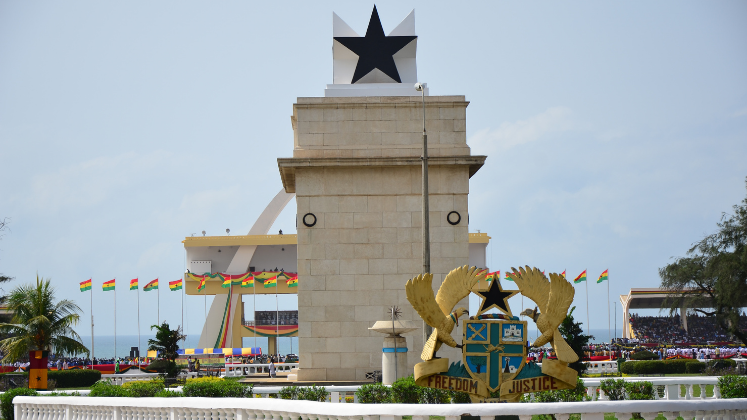
Image Credit: ‘Independence Arch and Independence Square, Accra, Ghana’ by Ben Sutherland licensed under CC BY 2.0
In the time between James’s first draft in 1958 and this 1964 draft with its added introduction, Nkrumah and the CPP had busily embarked on a project to transform Ghana into an internationalist, socialist state. This project sometimes pursued contradictory policies. Ghana became a beacon of internationalism and a haven for African freedom fighters, even as preventive detention measures silenced Togolese activists and forced deportations to rid the country of unwanted elements. National cultural symbols were created that were conducive to CPP ideology and often intimately tied to images of Nkrumah as leader, while massive infrastructure and modernization projects resulted in a ballooning bureaucracy and large-scale population re-settlements. At the same time, the plans and projects of Nkrumah and the CPP could never be imposed unilaterally from above. They were built up, constrained, and negotiated on the ground by young recruits, elders, intellectuals, journalists, market women, and expatriate experimenters, as well as by Nkrumah and party officials. In other words, Nkrumah-era Ghana was inspirational and aspirational, and it did produce results. But we should also see Nkrumah and the CPP for what the project was: a human and messy approach to nation-building.
The other noticeable omission from revised drafts of the book is any substantial reassessment of Eric Williams. Not only was James expelled from the PNM, but his relationship with Eric Williams became increasingly acrimonious. When James returned again to Trinidad in February 1965, Williams, fearing unrest on the oil fields, used recently passed legislation to place James under house arrest for a week.
Thus James broke not only with Nkrumah in the first half of the 1960s, but also with Eric Williams. This is not inconsequential to Nkrumah and the Ghana Revolution. Eric Williams’s leadership in Trinidad in the 1950s was crucial to James’s analysis of the uniqueness of the Ghana Revolution and the distinctive contribution of African and Caribbean leadership. James’s decision to retain part I of Nkrumah and the Ghana Revolution in its original 1958 rendering, therefore, involved a decision to affirm not only what Nkrumah had achieved in Ghana, but what Williams had achieved in Trinidad, despite subsequent disagreements with the actions of both men. And it prompts anew my question at the beginning of this introduction. If James knew more about Nkrumah’s revolutionary strategy in 1977 than he did in 1960, and if he broke so decisively from Williams’s strategy for independent Trinidad, then why did he insist upon publishing the manuscript without revision? Why, if so much had occurred to change conditions between James’s early draft of the manuscript and its publication, was he so sure of his original conclusions?
The answer to these questions is twofold. First, the structure and content of Nkrumah and the Ghana Revolution are driven by James’s historical sensibility. When the pioneering publisher and editor Margaret Busby worked with James in the mid-1970s to bring out some of his unpublished work, James carefully discussed with her each piece selected. Her new publishing house, Allison & Busby, collected significant pieces of James’s work and made them available in three volumes: The Future in the Present (1977), Spheres of Existence (1980), and At the Rendezvous of Victory (1984). James, she recalls, presented pieces to her in their discussions with a sense that “I wrote that, I am not changing it” (interview with Margaret Busby, 8 March 2018). This was something more than a determined spirit. James was a chronicler of movements: rewriting something he said previously would change the impression of what he thought at a particular time and alter the record. Instead, James kept his first draft about Nkrumah and Ghana as part I and supplemented it with further material. As part II of Nkrumah and the Ghana Revolution shows, James read the movements in the Caribbean, the Americas, and Africa as interlocutors in understanding the significance of Nkrumah’s Ghana. But what is crucial for understanding both parts of the book is precisely that these events and changing ideas were not revisions, but supplements. The structure of the book in two parts is key to James’s method and approach as a political activist, theoretician, and historian.
The second answer lies in the fact that James was not simply writing a history of the transition to political independence in the Gold Coast/Ghana; he was writing a blueprint of a new revolution. Nkrumah and the Ghana Revolution is, ultimately, a contribution to revolutionary theory (see the letters in appendix 1). This is James’s global thinking at work. It draws upon his knowledge of the French, American, Haitian, and Russian revolutions and applies these models to events in Ghana.
Note: This book extract gives the views of the author, and not the position of the LSE Review of Books blog, or of the London School of Economics and Political Science.
Nkrumah and the Ghana Revolution is available now from Duke University Press: https://www.dukeupress.edu/nkrumah-and-the-ghana-revolution. This edited excerpt is copyrighted to Duke University Press and is reproduced with their permission.



